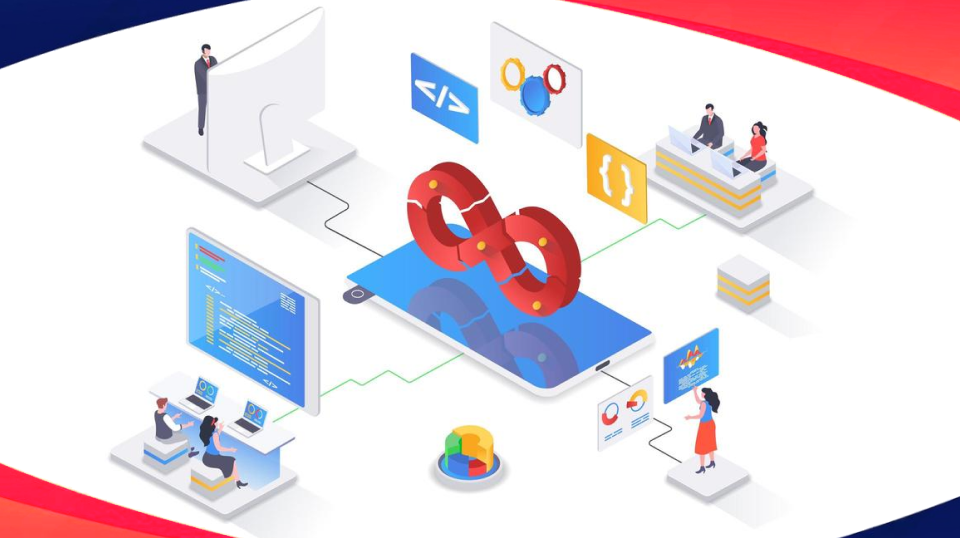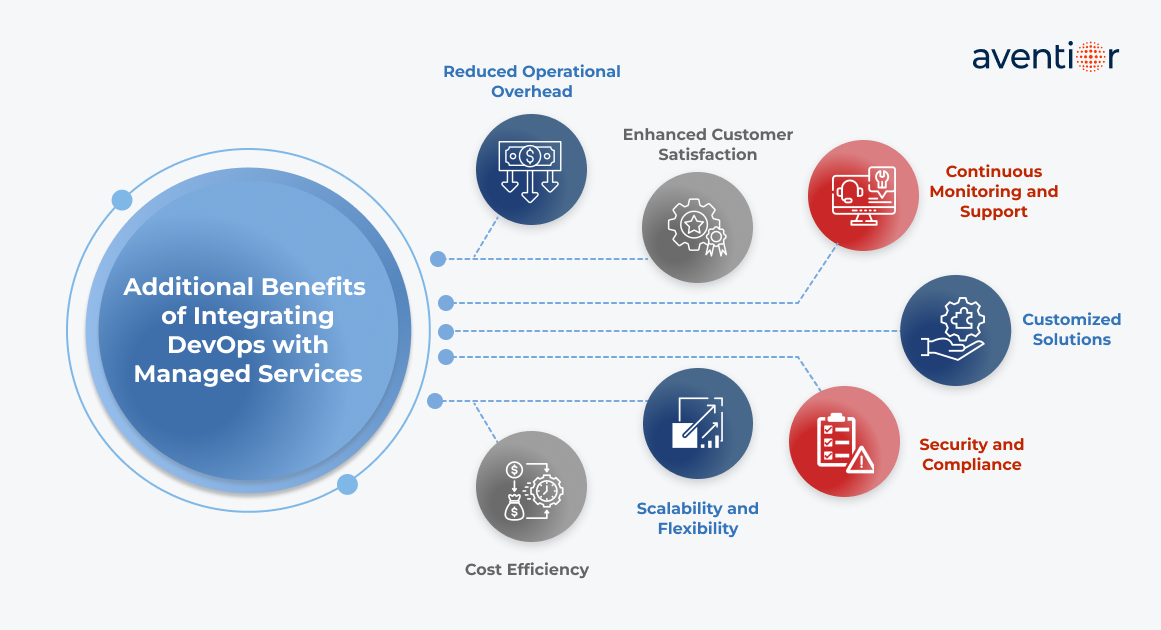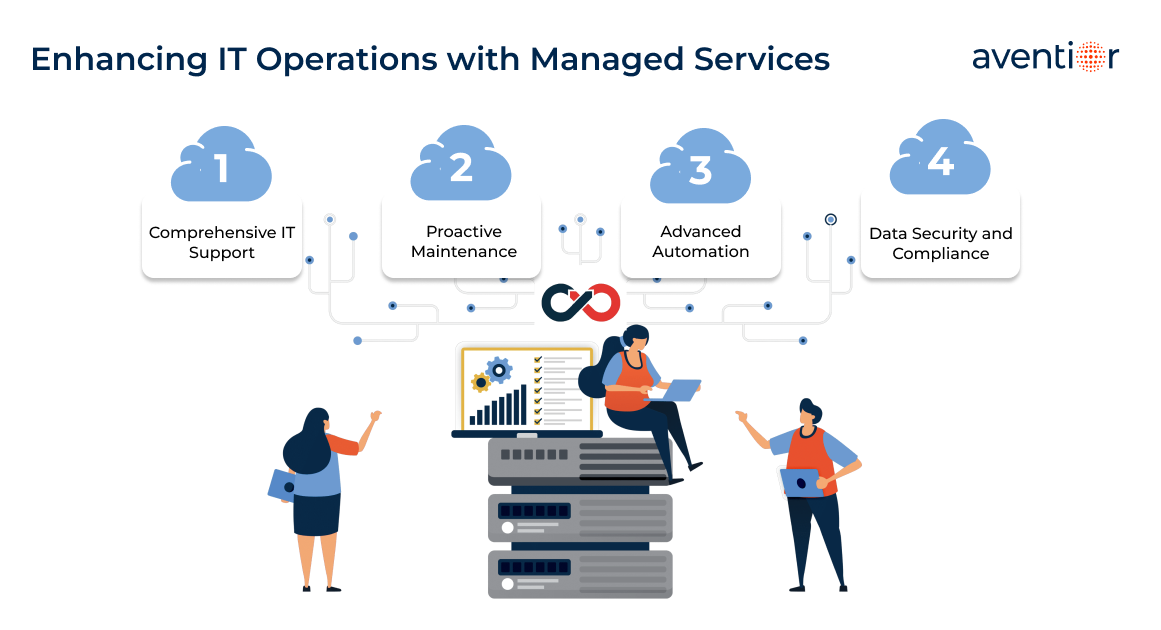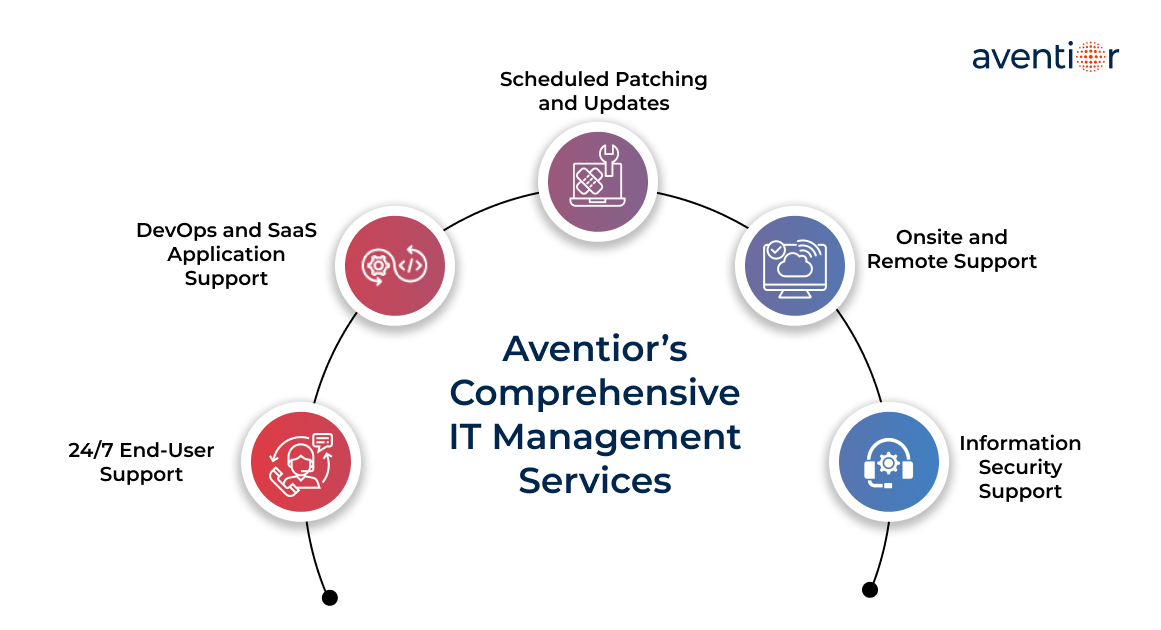
In the rapidly evolving world of technology, the DevOps methodology has emerged as a critical approach for optimizing software development and IT operations. As organizations seek to accelerate product delivery, enhance quality, and improve reliability, they are turning to cloud and hybrid environments.

While these environments offer scalability, flexibility, and cost-efficiency, they also come with complexities that require expert management. This is where
Aventior’s managed services step in to empower businesses to scale DevOps seamlessly for cloud and hybrid setups.
Navigating the Landscape: Cloud and Hybrid Environments
The emergence of cloud computing has transformed how businesses manage their infrastructure. With the cloud’s capacity to scale resources as needed, it has revolutionized both application hosting and service delivery. Moreover, hybrid environments, which blend on-premises infrastructure with cloud resources, provide an optimal balance of control and scalability.
However, managing these complex environments requires specialized expertise. This is where DevOps practices, which emphasize collaboration, automation, and continuous integration/continuous deployment (CI/CD), become essential. Aventior’s managed services offer the necessary expertise to navigate the intricacies of cloud and hybrid environments, ensuring seamless operation and optimization.
Empowering DevOps with Managed Services
Scaling DevOps in cloud and hybrid environments presents challenges, but managed services help organizations overcome them by providing expertise and tailored solutions. Here’s how managed services contribute to the successful implementation of DevOps:
- Expert Guidance:Managed service providers bring a wealth of experience and expertise in managing various cloud platforms, infrastructure components, and DevOps tools. Their teams of skilled professionals can guide organizations through best practices, helping them design, implement, and optimize their DevOps pipelines in alignment with the unique requirements of their environments.
- Continuous Integration and Continuous Deployment (CI/CD): CI/CD is crucial for automating code integration and deployment, leading to quicker release cycles. This automation minimizes errors and promotes better collaboration between development and operations teams, ensuring rapid and reliable software updates. By leveraging CI/CD, businesses can deliver new features and updates to customers more efficiently, maintaining a competitive edge.
- Advanced CI/CD Pipelines: While Continuous Integration and Continuous Deployment (CI/CD) pipelines form the backbone of DevOps, advanced CI/CD strategies take it a step further. Techniques such as blue-green deployments, canary releases, and feature toggles enable more granular control over software rollouts, minimizing risks and maximizing flexibility. Managed service providers play a crucial role in designing and implementing these advanced CI/CD pipelines, ensuring seamless integration with existing infrastructure and processes.
- Infrastructure Optimization and Cost Management: In cloud and hybrid environments, optimizing infrastructure utilization and managing costs are paramount. Managed service providers leverage tools and techniques for resource optimization, right-sizing instances, and implementing cost-effective storage solutions. Additionally, they provide insights and recommendations for cost management, helping businesses strike the right balance between performance and expenditure.
- Containerization and Orchestration: Containerization technologies like Docker and container orchestration platforms such as Kubernetes have revolutionized application deployment and management. Managed service providers assist in containerizing applications, orchestrating container clusters, and managing container lifecycles. This enables rapid deployment, scalability, and portability across diverse environments, facilitating DevOps practices in a containerized ecosystem.
- Infrastructure as Code (IaC): IaC revolutionizes infrastructure management by automating the setup and configuration of infrastructure through code. This approach offers scalability, consistency, and rapid deployment of resources, reducing human error and boosting efficiency. IaC allows organizations to treat infrastructure as software, enabling version control, repeatability, and automated provisioning.
- Automated Testing: Automated testing is vital for maintaining software quality, as it identifies bugs early in the development process. This results in faster development cycles, higher software quality, and more reliable end products. Automated tests can be run continuously, providing immediate feedback to developers, and ensuring that code changes do not introduce new issues.
- Monitoring and Logging: DevOps incorporates real-time monitoring and logging to oversee application and infrastructure performance. This enhanced visibility facilitates quick problem resolution, ensuring smooth and uninterrupted digital operations. By monitoring key metrics and logs, businesses can proactively address performance bottlenecks and security issues before they impact users.
- Serverless Computing:Serverless computing abstracts infrastructure management, allowing developers to focus solely on code development. Managed service providers offer serverless solutions that eliminate the need for provisioning and managing servers, enabling auto-scaling and pay-per-execution pricing models. This serverless paradigm aligns seamlessly with DevOps principles, promoting agility, efficiency, and innovation.
- AI and Machine Learning in Operations: Artificial Intelligence (AI) and Machine Learning (ML) technologies are increasingly integrated into IT operations, offering predictive analytics, anomaly detection, and automated remediation capabilities. Managed service providers harness AI/ML algorithms to optimize resource utilization, predict potential issues, and automate routine maintenance tasks. This proactive approach enhances system reliability, reduces downtime, and augments the efficiency of DevOps workflows.
- Hybrid Cloud Management: Managing hybrid cloud environments requires a holistic approach that spans on-premises infrastructure, public cloud platforms, and edge computing resources. Managed service providers offer comprehensive solutions for hybrid cloud management, including workload migration, data synchronization, and unified monitoring and governance. By bridging disparate environments seamlessly, businesses can leverage the scalability of the cloud while maintaining control over critical assets.
- DevSecOps Integration: Security is a fundamental aspect of DevOps, and integrating security practices into the development pipeline is essential for safeguarding digital assets. Managed service providers promote the adoption of DevSecOps principles, embedding security controls, vulnerability assessments, and compliance checks into CI/CD workflows. This proactive security posture minimizes security risks, ensures regulatory compliance, and fosters a culture of security awareness across the organization.
- Edge Computing and IoT Support: With the proliferation of Internet of Things (IoT) devices and edge computing infrastructure, managing distributed workloads at the network edge becomes imperative. Managed service providers offer edge computing solutions that enable the processing and analysis of data closer to the source, reducing latency and bandwidth consumption. By extending DevOps practices to edge environments, businesses can deploy and manage applications seamlessly across diverse edge locations.
Enhancing IT Operations with Security-Driven Managed Services
Robust security is essential to maintaining reliable and efficient DevOps operations. Managed services help secure cloud and hybrid environments with features like:
- MFA and Secure Server Access: Protecting sensitive assets with multi-factor authentication and secure access mechanisms ensures only authorized personnel can access critical resources.
- EDR & MDR (Endpoint & Microsoft 365 Detection & Response): Advanced detection and response solutions actively monitor, detect, and mitigate threats across endpoints and Microsoft 365 environments, minimizing risks and downtime.
- UDR (Unified Detection Response): By unifying email and information protection, UDR offers a cohesive approach to safeguarding sensitive communications and data.
- Secure Cloud Backup: Disaster recovery solutions provide businesses with reliable cloud backups, ensuring critical data is retrievable in case of unexpected events.
These pillars form a comprehensive framework that aligns security measures with business continuity and compliance goals.
Optimizing IT Operations for Growth and Scalability
Managed services extend beyond operational efficiency to enable business growth:
- Rapid Onboarding: Efficient day-one setup for new hires, including hardware provisioning, account creation, and IT welcome kits, accelerates workforce productivity.
- Facilities Build: Outs: Support for expansion and new location setups ensures seamless transitions, maintaining operational continuity.
- Full IT Department Management: By incorporating onsite technicians and leveraging monitoring services, Aventior acts as an extension of your IT team, delivering holistic management and support.
Additional Benefits of Integrating DevOps with Managed Services

- Reduced Operational Overhead: Scaling DevOps often requires a significant investment in resources, both human and financial. Managed services offload a considerable portion of the operational burden by handling routine tasks such as infrastructure provisioning, monitoring, security updates, and maintenance. This allows internal teams to focus on strategic development tasks rather than routine operations, maximizing productivity and innovation.
- Enhanced Customer Satisfaction: The efficiency and reliability brought by DevOps result in higher customer satisfaction. Quick response times, consistent service delivery, and proactive problem-solving build trust and foster long-term client relationships. Satisfied customers are more likely to remain loyal, provide positive feedback, and recommend services to others.
- Continuous Monitoring and Support: Managed service providers offer 24/7 monitoring and support, ensuring that applications and services run smoothly. They can proactively identify and address issues, reducing downtime and ensuring high availability. This aligns perfectly with the DevOps principle of continuous improvement. Constant monitoring and quick resolution of issues are critical to maintaining user satisfaction and operational efficiency.
- Customized Solutions: Every organization’s cloud and hybrid setup is unique. Managed services providers work closely with businesses to understand specific requirements and tailor solutions accordingly. This flexibility allows organizations to adapt DevOps practices to their environments seamlessly. Tailored solutions ensure that businesses can leverage the full potential of DevOps without being constrained by generic approaches.
- Security and Compliance: Security is a top concern in any environment, especially with hybrid setups. Managed services providers implement robust security measures and ensure compliance with industry standards and regulations such as HIPAA, GDPR, and others. This protects sensitive data and maintains the integrity of the DevOps processes. Regular security audits and compliance checks are conducted to ensure ongoing adherence to best practices and legal requirements.
- Scalability and Flexibility: Cloud and hybrid environments offer scalability, and managed services enhance this capability. As organizations grow, their DevOps infrastructure can scale effortlessly with the help of managed service providers, ensuring that the architecture remains agile and adaptable. Scalability ensures that businesses can handle increased workloads without compromising performance or reliability.
- Cost Efficiency: Automating processes and improving operational efficiency through DevOps also translates into cost savings. By reducing the need for manual intervention and minimizing errors, businesses can lower operational costs and reallocate resources to more strategic areas. Cost savings can be reinvested into innovation and growth initiatives, driving long-term success.
Aventior’s Approach to Managed DevOps Services

Aventior, a renowned managed services provider, stands out in its approach to scaling DevOps for cloud and hybrid environments. With a proven track record of assisting organizations across industries, Aventior brings the following benefits:
- Tailored Solutions: Aventior’s team collaborates closely with each client to design customized DevOps solutions that align with their unique technology stack, requirements, and business goals. Customized solutions ensure that each client’s specific needs are met, enabling them to achieve their objectives efficiently.
- Comprehensive Support: From initial setup to ongoing maintenance, Aventior provides end-to-end support, ensuring that DevOps pipelines are optimized for efficiency, reliability, and scalability. Comprehensive support ensures that businesses can rely on Aventior for all aspects of their DevOps journey, from planning and implementation to continuous improvement.
- Automation Expertise: Aventior leverages automation to streamline processes, minimize human errors, and accelerate development cycles. This approach aligns with DevOps principles and enables faster time-to-market. Automation expertise ensures that businesses can fully exploit the benefits of DevOps automation, enhancing overall productivity and quality.
- Hybrid Expertise: Aventior understands the intricacies of managing hybrid environments, enabling clients to seamlessly bridge on-premises and cloud infrastructure while maintaining a robust DevOps culture. Hybrid expertise ensures that businesses can leverage the best of both worlds, combining the control of on-premises infrastructure with the scalability of the cloud.
Enhancing IT Operations with Managed Services

In addition to supporting DevOps, managed services play a vital role in enhancing overall IT operations. Here are some key areas where managed services make a significant impact:
- Comprehensive IT Support : Managed services provide extensive IT support, covering everything from helpdesk assistance to advanced technical support. This ensures that all IT-related issues are promptly addressed, minimizing disruptions, and maintaining productivity. By offloading these responsibilities to an MSP, businesses can focus on their core activities, knowing that their IT infrastructure is in capable hands.
- Proactive Maintenance : Regular maintenance is essential to prevent IT issues, ensuring high performance and reliability. MSPs perform routine checks and updates to identify and address potential problems early, minimizing downtime and costly repairs. Scheduled patching, tailored to diverse environments, is a key component of this proactive approach.
- User Workstations: Automated patching during non-peak hours with user-determined restart options for convenience.
- Lab Workstations and On-Prem Servers: Coordinated cycles that align with instrument availability and usage patterns, ensuring minimal disruptions.
- Proactive Monitoring:24/7 endpoint, network, and cloud monitoring identifies and addresses potential issues before they escalate, guaranteeing consistent performance.
- Advanced Automation: Leveraging automation is a cornerstone of modern IT management. MSPs use advanced automation tools to streamline repetitive tasks, reduce human errors, and accelerate response times. Automation enhances efficiency and service delivery by allowing quicker and more accurate handling of routine operations, thereby freeing up resources for more strategic initiatives.
- Data Security and Compliance: Data security is a top concern for businesses, especially those handling sensitive information. MSPs implement robust security protocols and ensure compliance with regulatory standards such as HIPAA, GDPR, and others. By safeguarding data integrity and privacy, MSPs protect businesses from breaches and ensure that they meet necessary legal requirements.
- Security Audits and Vulnerability Scanning: Regular assessments identify potential weaknesses and reinforce defenses against emerging threats.
- Alignment with Cybersecurity Standards: By adhering to frameworks such as CIS and Zero Trust, Aventior ensures that IT operations are secure, scalable, and resilient.
Aventior’s Comprehensive IT Management Services

Aventior’s managed services extend beyond basic IT support to deliver comprehensive solutions that optimize and enhance DevOps practices. Key offerings include:
- 24/7 End-User Support: Around-the-clock IT assistance ensures swift resolution of issues, minimizing disruptions and maintaining productivity.
- DevOps and SaaS Application Support: Expertly managing SaaS applications and supporting DevOps pipelines for seamless integration and performance optimization.
- Scheduled Patching and Updates: Leveraging tools like Kandji and Intune, Aventior ensures secure, automated updates during non-disruptive hours, enhancing system reliability.
- Onsite and Remote Support: Combining remote ticket-based assistance with selective onsite presence allows for effective problem-solving tailored to specific business needs.
- Information Security Support: Proactive measures such as vulnerability scanning and endpoint protection align with CIS and Zero Trust frameworks for unmatched security.
Measuring Success and Continuous Improvement
To ensure the effectiveness of managed services, it is crucial to measure success through Key Performance Indicators (KPIs). These metrics help track progress, identify areas for improvement, and ensure that service objectives are met. Common KPIs include response and resolution times for support tickets, incident management effectiveness, system uptime and reliability, and customer feedback ratings.
Regular status updates and open communication channels are essential for transparency and continuous improvement. These practices enable real-time feedback and adjustments, ensuring that managed services align with evolving business needs and objectives.
24/7 Support and Global Reach
In today’s interconnected world, where businesses operate across different time zones and geographical locations, round-the-clock IT support has become a necessity rather than a luxury. Managed service providers (MSPs) recognize the importance of providing continuous coverage to ensure that businesses can address issues promptly and maintain uninterrupted operations.
The ‘follow-the-sun’ model is a key strategy employed by MSPs to deliver 24/7 support effectively. This model involves strategically distributing support teams across various locations worldwide, ensuring that there is always a team available to offer assistance regardless of the time of day or night.
Conclusion
Scaling DevOps in cloud and hybrid environments presents both challenges and opportunities. Managed services, exemplified by industry leaders like Aventior, empower organizations to navigate these complexities effectively. The integration of DevOps practices with managed services transforms IT operations, driving efficiency, reliability, and agility. This synergy not only enhances the delivery of IT services but also provides a competitive edge in a rapidly changing digital landscape. As businesses strive to navigate these complexities, adopting DevOps within managed services becomes essential for sustainable success. By leveraging expert guidance, reducing operational overhead, ensuring security and compliance, and providing scalable solutions, managed services are a cornerstone of successful DevOps implementation in today’s dynamic IT landscape.
To know further details about our solution, do email us at info@aventior.com.



 +1 (617) 221-5900
+1 (617) 221-5900
 Follow Us
Follow Us
